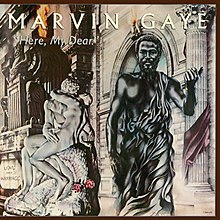Here, My Dear
| Here, My Dear | ||||
|---|---|---|---|---|
 |
||||
| Studio album by Marvin Gaye | ||||
| Released | December 15, 1978 | |||
| Recorded | March 24, 1977 – July 9, 1978 | |||
| Studio | Marvin's Room, Los Angeles, California) | |||
| Genre | Soul, funk | |||
| Length | 73:10 | |||
| Label | Tamla | |||
| Producer | Marvin Gaye | |||
| Marvin Gaye chronology | ||||
|
||||
| Singles from Here, My Dear | ||||
|
||||
| Professional ratings | |
|---|---|
| Review scores | |
| Source | Rating |
| AllMusic | |
| Blender | |
| Chicago Tribune | |
| The Guardian | |
| Mojo | |
| PopMatters | 9/10 |
| Q | |
| The Rolling Stone Album Guide | |
| Uncut | |
| The Village Voice | B+ |
Here, My Dear is the fifteenth studio album by music artist Marvin Gaye, released December 15, 1978, on Motown-subsidiary label Tamla Records. Recording sessions for the album took place between 1977 and 1978 at Gaye's personal studios, Marvin Gaye Studios in Los Angeles, California. The album was notable for its subject matter's being dedicated to the fallout of Gaye's marriage to his first wife, Anna Gordy Gaye. Initially a commercial and critical failure upon its release, it was later hailed by music critics as one of Gaye's best produced albums in the years following Gaye's death. "It's taken me a while," Anna Gordy admitted in later years, "but I've come to appreciate every form of Marvin's music."
Marvin Gaye was going through a personal crisis in the summer of 1976. In November 1975, Gaye's estranged first wife, Anna Gordy Gaye, sued Gaye for divorce, claiming irreconcilable differences, and sought child support for their adopted son, Marvin Gaye III. Gaye later argued his spending habit was causing him to fall behind on payments. In September 1976, a warrant was issued for Gaye's arrest after he failed to pay alimony; this made him to feel vulnerable during the recording sessions causing the singer to hide from the public for several days.
Several weeks later, Gaye accepted an offer to do a tour of Europe. Between October and December 1976, Gaye performed in the United Kingdom, France, the Netherlands and Germany. Following his return, he recorded "Got to Give It Up" and released it on his album, Live at the London Palladium. The song became an international hit, reaching number one on the Billboard Hot 100.
After months of delays, in March 1977, the singer's attorney Curtis Shaw wanted to end divorce proceedings and convinced Marvin to give up half of the percentage of album royalties he would earn from his next Motown album to Anna. The Gayes' divorce was finalized in June.
...
Wikipedia
